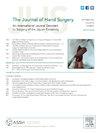社会剥夺程度高的腕管综合征患者的身心健康差异
IF 2.1
2区 医学
Q2 ORTHOPEDICS
引用次数: 0
摘要
目的社会、心理和身体健康具有复杂的相互关系,它们各自影响着个人的整体健康体验。社会环境已被证明会影响各种医疗条件下残疾的症状强度和程度。我们检验了零假设,即社会剥夺不会影响患者报告的结果测量信息系统(PROMIS)评分或就诊的腕管综合征(CTS)患者的客观健康因素。方法本横断面研究分析了2016年8月1日至2017年6月30日在某三级学术中心向6名手外科医生中的1名提出CTS评估的367例患者的数据。患者完成PROMIS身体功能- v1.2、疼痛干扰- v1.1、抑郁- v1.0和焦虑- v1.0计算机适应测试。区域剥夺指数被用来量化社会剥夺。医疗记录审查确定了每位患者的症状持续时间、烟草和阿片类药物使用以及查尔森合并症指数(CCI)。样本人口统计、PROMIS得分和客观健康措施在按国家社会剥夺四分位数定义的群体中进行比较。结果生活在最贫困四分位数的CTS患者在所有4个PROMIS域的平均得分低于生活在最贫困四分位数的CTS患者。最贫困的四分之一人群的焦虑水平高于最贫困的四分之一人群(37.3%对12.6%)。在最贫困的四分位数中,CCI的平均值较高,使用烟草的个人比例也较高。每个剥夺四分位数的患者在阿片类药物使用或症状持续时间方面没有差异。结论社会剥夺与CTS患者自述健康状况较差有关。与来自最贫困地区的患者相比,来自最贫困地区的患者在就诊时也有更大的合并症负担和更高的烟草使用率。研究类型/证据水平预后II。本文章由计算机程序翻译,如有差异,请以英文原文为准。
Mental and Physical Health Disparities in Patients With Carpal Tunnel Syndrome Living With High Levels of Social Deprivation
Purpose
Social, mental, and physical health have a complex interrelationship with each influencing individuals’ overall health experience. Social circumstances have been shown to influence symptom intensity and magnitude of disability for a variety of medical conditions. We tested the null hypothesis that social deprivation would not impact Patient-Reported Outcomes Measurement Information System (PROMIS) scores or objective health factors in patients presenting for treatment of carpal tunnel syndrome (CTS).
Methods
This cross-sectional study analyzed data from 367 patients who presented for evaluation of CTS to 1 of 6 hand surgeons at a tertiary academic center between August 1, 2016, and June 30, 2017. Patients completed PROMIS Physical Function—v1.2, Pain Interference—v1.1, Depression—v1.0, and Anxiety—v1.0 Computer Adaptive Tests. The Area Deprivation Index was used to quantify social deprivation. Medical record review determined duration of symptoms, tobacco and opioid use, and the Charlson Comorbidity Index (CCI) for each patient. Sample demographics, PROMIS scores, and objective health measures were compared in groups defined by national quartiles of social deprivation.
Results
Patients with CTS living in the most deprived quartile had worse mean scores across all 4 PROMIS domains compared with those living in the least deprived quartile. A higher proportion of individuals from the most deprived quartile had a heightened level of anxiety than those in the least deprived quartile (37.3% vs 12.6%). The mean CCI was higher in the most deprived quartile, as was the proportion of individuals using tobacco. There were no differences in opioid use or symptom duration between patients from each deprivation quartile.
Conclusions
Social deprivation is associated with worse patient-reported health measures in patients with CTS. Compared with those from the least deprived areas, patients from the most deprived areas also have a greater comorbidity burden and higher rates of tobacco use at presentation to a hand surgeon.
Type of study/level of evidence
Prognostic II.
求助全文
通过发布文献求助,成功后即可免费获取论文全文。
去求助
来源期刊
CiteScore
3.20
自引率
10.50%
发文量
402
审稿时长
12 weeks
期刊介绍:
The Journal of Hand Surgery publishes original, peer-reviewed articles related to the pathophysiology, diagnosis, and treatment of diseases and conditions of the upper extremity; these include both clinical and basic science studies, along with case reports. Special features include Review Articles (including Current Concepts and The Hand Surgery Landscape), Reviews of Books and Media, and Letters to the Editor.

 求助内容:
求助内容: 应助结果提醒方式:
应助结果提醒方式:


